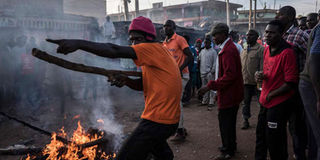Critical issues arising out of elections need to be addressed

A Nasa supporter gestures towards riot police as they wait for the election results to be announced on October 30, 2017 at Kawangware in Nairobi. A glance at social media reveals that Kenyans harbour ethnic hate and prejudices. PHOTO | FREDRIK LERNERYD | AFP
What you need to know:
- The scale and pattern of violence, and the feeling of exclusion by a section of society, should not be ignored.
- We have not addressed the root causes of divisions because there is no political will to do so.
On Monday, the Independent Electoral and Boundaries Commission declared President Uhuru Kenyatta re-elected for a second time.
This followed the October 26 fresh presidential election that was necessitated by the Supreme Court nullification of the August 8 poll over “rampant illegalities and irregularities”.
This time around, Nasa presidential candidate Raila Odinga and his running mate, Mr Kalonzo Musyoka, withdrew from the poll and urged their supporters to stay away, saying the poll would be a sham.
Mr Kenyatta won with a 98 per cent margin among the nearly 7.5 million votes out of a possible 20 million votes.
RULE OF LAW
The elections have exposed the country’s seedy underbelly with regard to national cohesion, the use of force in public order management and the role and independence of constitutional commissions and independent offices.
There have also been discussions about whether or not the rule of law, human rights and equality before the law even exist.
Over the past 14 days, several protesters have been shot dead, a commissioner with the IEBC fled the country, the chairperson publicly expressed doubt about holding a credible poll, a bodyguard of Deputy Chief Justice Philomena Mwilu was shot in her official car two days before the poll, and the Supreme Court botched the hearing of a petition against the repeat election due to lack of quorum.
CLASHES
On October 26, the poll was held but with a historic low voter turnout; and police battled protesters in Nasa strongholds of Nyanza, western Kenya, Nairobi and Machakos.
The IEBC then cancelled elections in Kisumu, Homa Bay, Migori and Siaya counties.
But IEBC flip flopped on the voter turnout; a Jubilee MP was caught on video harassing a returning officer in Kandara, Murang’a County; and, clashes reminiscent of the 2007-08 post-election violence were reported in Nairobi’s Kawangware slums.
In William Shakespeare’s play titled, Hamlet, a palace guard who was angered by mismanagement of the country’s body politic famously uttered the following words:
“There is something rotten in the state of Denmark… it is festering with moral and political corruption.”
VIOLENCE
Perhaps it is time Kenyans realised that there is something rotten in the State and demanded it be fixed before it is too late.
The scale and pattern of violence, and the feeling of exclusion by a section of society, should not be ignored.
The use of excessive force, killing of protesters and the ethnic-based violence in Kawangware are all wrong and must be condemned and efforts made to arrest and prosecute the culprits.
In the words of Martin Luther King: “Injustice anywhere is a threat to justice everywhere.”
INSTITUTIONS
After the 2007-08 post-election violence, millions of shillings were spent collecting testimonies and views of citizens and experts and reports compiled.
These are the Kriegler Report on elections, the Waki Report on election violence, the Ransley Report on police reform and the TJRC Report, which highlighted historical injustices, the conduct of elections, policing, distribution of resources, ethnic equality and justice, and impunity and corruption.
As a result, key institutions, including Ipoa, NPS, NPSC, EACC, IEBC and NCIC were set up to monitor and address these issues.
Which begs the question: Have they done so?
ELECTIONS
A glance at social media reveals that Kenyans harbour ethnic hate and prejudices.
We have not addressed the root causes of divisions because there is no political will to do so.
Kenyans, including leaders, must understand that elections are not the only ingredient in a democracy.
Free and fair elections stand side by side with active participation of the people in politics and civic life; the protection of human rights; and, the rule of law, which applies equally to all the citizens.
Mr Kiprono is a senior legal officer, Article 19 Eastern Africa. [email protected] Twitter: @kipdemas Website: www.demasvox.com





